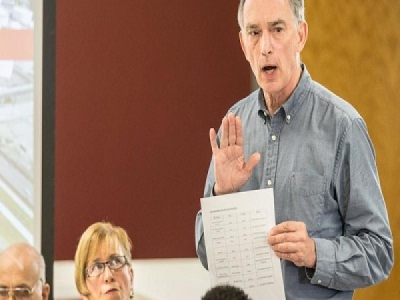
Posted on July 18, 2017
By Javonte Anderson, Post-Tribune
Tempers flared Saturday during a meeting at which members of an East Chicago environmental advocacy group hoped to win the support of U.S. Rep. Pete Visclosky, D-Merrillville, in opposing a permit allowing the U.S. Army Corps of Engineers’ to store higher concentrations of PCB waste dredged from the Indiana Harbor and Canal at an East Chicago facility.
“The answer is no,” Visclosky said in response to Community Strategy Group’s request. “I will not sign a letter saying that I oppose the permit.”
Visclosky’s response came after an hour-long presentation at the East Chicago Public Library Robert Pastrick branch, at which environmental advocates and East Chicago residents detailed their concerns about allowing the Army Corps to dispose of higher levels of contaminants in a confined disposal facility at 3500 Indianapolis Blvd.
His decision angered those at the standing-room-only meeting.
“This is unconscionable,” said Sheilah Garland, a political organizer with the National Nurses Organizing Committee. “This is insulting to us. …We want you to stand with us. We elected you to represent us.”
Visclosky was frequently interrupted by emotional outbursts as he tried to explain why he refused to oppose to permit. The audience began chanting “no permit, no permit.” One woman stormed out of the room crying.
“It is my responsibility to make sure that those who have the expertise to make these decisions have the resources they need and that they abide by the letter and the rule of the law,” Visclosky said.
The Army Corps has been dredging sediment containing toxic PCBs from the canal and disposing of it in East Chicago since 2012. Under current regulations, the agency is permitted to dredge and store canal sediment that is below the 50 parts per million threshold. The Toxic Substance Control Act permit being sought by the Army Corps would allow the storage of PCB sediment with a concentration at or greater than 50 parts per million.
“PCB-contaminated sediment in the canal is a threat to humans and the ecosystem, including nearby Lake Michigan,” said Natalie Mills, the Army Corps’ manager for the Indiana Harbor and Canal dredging project. “(The Army Corps) proposes to safely dredge the sediment and place it in the (container disposal facililty), where it can be effectively monitored and managed to minimize any potential harmful health effects.”
The Rev. Cheryl Rivera, executive editor of the Northwest Indiana Federation of Interfaith Organizations and a Community Strategy Group organizer, said there are too many dangerous substances in East Chicago.
“We’re concerned about the overburdening of pollutions and contaminants that have assaulted the East Chicago community,” Rivera said.
“Protecting the people is the number one priority,” she said. “The health of the people. And you’re hearing about people’s families dying and you have the audacity to stand there and say to us that you will permit this permit.”
State Sen. Lonnie Randolph, D-East Chicago, one of several local politicians in attendance, said there have been too many environmental issues plaguing East Chicago residents.
“We don’t want the canal sediments being dumped on Indianapolis Boulevard,” he said. “We don’t know how far the contamination can spread. Why is it that East Chicago has all these contaminants? I think it’s time for us to stand up and say enough is enough.”
Despite disagreeing with residents about the permit, Visclosky said he lauded community members’ efforts to raise awareness of the environmental problems in their town.
“We have one made progress over the last generation and I would also suggest that your voice is being heard,” he said. “You have captured people’s attention and you are being effective.”
Despite not receiving the Congressman’s support, Thomas Frank, a Community Strategy Group organizer, said he was proud of how East Chicago residents had rallied together to push back against the Army Corps receiving the PCB permit.
“We’re going to continue to push forward,” he said. “East Chicago has not seen this kind of unity on any project on this level of any kind.”
Source: Chciago Tribune





